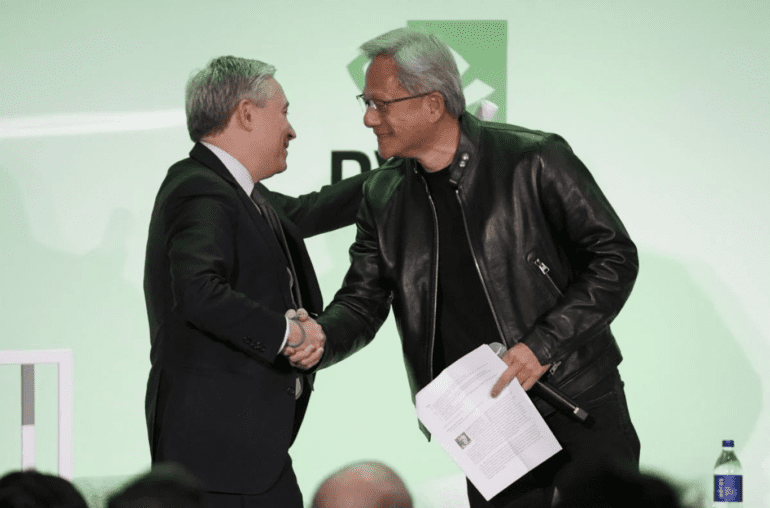TL;DR:
- Canada signs a letter of intent with Nvidia, a leading AI chip giant, to enhance computing power.
- The partnership seeks to leverage Canada’s strong AI research history and the contributions of AI pioneers like Yoshua Bengio and Geoffrey Hinton.
- Nvidia’s CEO, Jensen Huang, expresses enthusiasm for Canada’s potential in AI and emphasizes the need for funding and resources.
- A consortium approach, proposed by Stephen Toope, could help Canada efficiently procure computing capacity without manufacturing its own chips.
- Canada’s AI talent ranking has slipped in recent years, raising concerns about limited access to computing power.
- The collaboration marks a significant step for Canada’s AI ecosystem, positioning it for growth and global recognition.
Main AI News:
In a significant stride toward bolstering its AI capabilities, Canada has recently inked a letter of intent with the AI chip juggernaut, Nvidia. Industry Minister François-Philippe Champagne made the exciting announcement via X, formerly known as Twitter. This groundbreaking agreement with the California-based powerhouse comes on the heels of Nvidia’s remarkable ascent in the AI innovation race, propelling its valuation past the impressive $1.5 trillion mark.
Despite the anticipation surrounding this partnership, the contents of the signed letter remain shrouded in secrecy. Nvidia’s Chief Executive, Jensen Huang, visited Toronto for this momentous occasion and remained tight-lipped about the specifics. Minister Champagne, however, expressed his enthusiasm for the collaboration, emphasizing the importance of Canada’s access to cutting-edge technology and the necessity of securing the required funding to develop its own AI infrastructure.
Huang echoed the sentiment, highlighting Canada’s significant contributions to the field of AI, dubbing it the birthplace of modern AI. The country boasts influential figures in the AI world, including the renowned “godfathers” of the technology, Yoshua Bengio and Geoffrey Hinton, who conducted groundbreaking AI research in Canada. Notably, they, along with Yann LeCun, received the prestigious A.M. Turing Award, often referred to as “the Nobel Prize of computing.”
Bengio and Hinton have furthered their commitment to AI by establishing AI research hubs – the Vector Institute in Toronto and Mila in Montreal. With this rich history and burgeoning AI research, Huang stressed the importance of providing researchers with the necessary resources and funding to advance their work.
While enjoying a meal at the Four Seasons Hotel in Toronto, Huang, known for his signature black leather jacket, shared his insights with a Canadian Press reporter. He also took the stage alongside industry luminaries such as Raquel Urtasun from autonomous driving company Waabi, Aidan Gomez from AI powerhouse Cohere, Alán Aspuru-Guzik of the Vector Institute, and Brendan Frey from drug discovery firm Deep Genomics. Together, they discussed the strategies needed to accelerate Canada’s AI ecosystem.
Huang emphasized that Canada possesses abundant research and talent, a sentiment echoed by Stephen Toope, President of the Canadian Institute for Advanced Research. However, Toope expressed concerns about Canada’s slipping global ranking in AI talent, as noted in a report by U.K. firm Tortoise. The ranking for AI capacity, which measures a nation’s AI adoption and development capabilities, has also declined.
Toope’s worry extends to Canada’s AI infrastructure ranking, which fell from 15th to 23rd between 2021 and 2023. He expressed his concern that the researchers in Canada might face limitations in their work due to inadequate access to computing power, including power sources, data centers, and chips.
While most chips are supplied by the Taiwan Semiconductor Manufacturing Company, Toope believes Canada’s lack of major foundries makes it unlikely for the country to compete in chip production. However, Huang sees a different solution, emphasizing that Canada doesn’t necessarily need to manufacture chips, as numerous companies excel in this field.
Toope proposes the adoption of a purchasing consortium, supported by the Canadian government and involving both public and private entities. This consortium could streamline the process of procuring computing capacity, ensuring a steady and efficient supply without the need for domestic chip production.
Conclusion:
Canada’s collaboration with Nvidia signifies a pivotal move towards strengthening its position in the global AI market. With a rich history in AI research and strategic partnerships, Canada is poised to tap into the immense potential of AI technology, provided it can secure the necessary resources and funding. The proposed consortium approach could further expedite its progress, making Canada a formidable player in the ever-evolving AI landscape.

